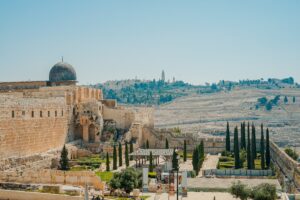As I walked through the dusty streets of Jerusalem, this revolutionary thought ran through my head, “God is not American.” I know this may seem obvious. God is not a man. But Jesus was, and God’s chosen came from the line of Abraham—a middle eastern man. I lived in Europe where I experienced cultural differences, but America’s roots can be found in Europe. Maybe that’s why Europe didn’t feel that different from home compared to the land of Israel. I had never experienced anything like the Arabic world. So, the first time I journeyed through the Holy Land, I began to realize how this truth affected my study of the Bible and my faith.

Reading the Bible with American Filters
We don’t realize it, but we all read our Bible with filters. The official term for these filters is “hermeneutical biases.” We read scripture through the lens of our culture and gender. We also read it through our wounds as well as blessings. Those who grew up with wonderful dads read the Bible differently than those who suffered from abusive fathers. These filters affect our understanding of the Bible and how we can or cannot apply it to our lives. This is why considering the culture of the Bible and our Savior is so important.
Culture Differences Between the East and West
I’m from the south (southwest, actually.) For the most part, those from this part of the country are friendly. We smile a lot, stand in line, and wait our turn. We may be boiling on the inside, impatient as anyone else, but we stay in the line. I was shocked to realize how those from the East do not patiently stand in line. They go for it. This isn’t an Arabic-only observation, I’ve noticed it with Asians too. This difference does not affect my faith, but it does help me visualize my God and biblical characters better.
Other cultural differences affect our Bible reading. According to an article posted on the Fund for Education Abroad, two differences are very important: time perception and ties to community. In the United States, we view time sequentially while the Arab world views time synchronously. The author writes:
“In my short time in the Middle East it’s very apparent that people here have a synchronous perception of time. Meaning the past present and future are kind of blended into each other and flexibility is necessary in order to function in this society.”
The past, present, and future are blended.

The Time Difference
Everything we, as Americans do, centers around sequential time. We’re constantly in a hurry. We put everything in a past, present, and future order, use timelines, and schedule our days. We’re upset when the schedule gets changed. I’m typing this article on a road trip (while my husband drives) and listening to the radio commentator reporting on all the hassles travelers are facing this holiday weekend. Flights have been delayed and canceled, and people are stuck in airports. This drives Americans crazy – all because of our view of time. We live chronologically.
Synchronic cultures view time as cyclical, not like our beloved straight timelines. They view time as a cycle that happens over and over. As stated earlier, the past, present, and future are blended. Does this remind you of anyone? Think of God’s perception of time. He invented it, right? He is the same yesterday, today, and tomorrow. Which perception of time do you think God uses? It may be easier to understand this form of time as a “big picture” time focus. While events do seem to lead to other events, none change the plans of God. “For I know the plans I have for you, says the Lord, “plans to prosper, not to harm, plans to give you hope and a future.”
The Community Culture Difference
Just as Americans hold a different perspective on time, we are hyper-focused on our independence. We place more value on the individual instead of family and community. God is a personal God, yet he’s a God who chose to bless a whole people group through Abraham. To God, family is everything. As Gentiles, we have been blessed with the Way for all people to be saved, but that doesn’t mean God has rejected his first chosen children.
As far as the gospel is concerned, they are enemies for your sake; but as far as election is concerned, they are loved on account of the patriarchs, for God’s gifts and his call are irrevocable (Romans 11:28).

Independence and individualism is not just an American thing; it’s a condition of the human heart. Some of us struggle with trusting others, and that makes us independent souls.
We also don’t live or think communally. Our kids grow up and move away. We don’t expect our children to build onto our home, or plan on living side by side. It’s also not our nature to keep a covenant forever, especially if the person who made the covenant with us broke his side of the agreement. It’s hard for us to believe God will never leave us or forsake us. But God will welcome us back home even after we’ve left our faith because He holds covenants and family as sacred.

God’s Language Is Not English
Our cultural expectations are different, but our language also affects our understanding of scripture. We realize English-speaking people did not write the letters, poems, and stories in the Bible, but few of us take into account how this can interfere with our understanding of a scripture passage. The Hebrew authors filled the Bible with idioms.
An idiom cannot be taken literally, yet most of us read everything in the Bible with a literal lens. An example of an idiom is “under the weather.” When we use this phrase, we paint a picture of a sick friend, not someone holding up heavy clouds. Jesus’s discourse about a good eye and a bad eye employs an idiom.
“For where your treasure is, there your heart will be also. The eye is the lamp of the body. If your eyes are good your whole body will be full of light. But if your eyes are bad, your whole body will be full of darkness. If then the light within you is darkness, how great is that darkness! “No one can serve two masters. Either you will hate the one and love the other, or you will be devoted to the one and despise the other. You cannot serve both God and money.” (Matthew 6:21-24)

A literal interpretation of this passage revolves around the “health” of the eye. It seems like Jesus changed subjects: going from the “treasures in our hearts” to “healthy or unhealthy eyes,” and then to “serving God or money.” But actually, this teaching flows beautifully when you realize that a “good eye” is a generous eye and a “bad eye” is stingy. If your eyes are good you are a generous person who loves to share his wealth, but if your eyes are bad your heart is stingy and finds it hard to give.
God’s Celebrations and Festivals
We view God as an independence loving American who shoots off fireworks on the 4th of July, but if we really want to know God better, it will help to study the festivals and holidays he put in place. We don’t have to celebrate them, but refusing to learn about the culture of the people God chose is like refusing to learn the language and culture of the people you’re visiting in a foreign country—refusing to try their food, snubbing what’s important to them.
Pray with Me
“Dear Father, we want to know you better. We want to grow closer to you. Forgive us for putting our filters on you. You don’t look or act like us at all. Take our glasses off that are shading and distorting who you really are. Thank you for your grace. You know how our past drives our understanding of you. Help us start fresh. Open our eyes, we want to see Jesus and you, God, as you truly are. Amen.”




Wonderful thoughtprovoking and mindset searching
Thanks Cindy! Keep on searching! Thanks for stopping by and sharing your thoughts.
So good! Thank you, Andy, for reminding me of this important bible study mindset!!
Thanks Diana! It brings the Bible to life!
Love this! Such a good reminder that we Americans are not the center of the universe. I need to change lenses as I read the scripture.
Hey Lisa! I’m so excited for you to start reading the Bible with this filter! Praying it comes to life!
I loved my recent trip to Isreal. The wonderful history, food and sites of where Jesus walked was an experience I will never forget. These folks were scary smart and could speak various languages. When I read the Bible or visit a new location, I am reading or experiencing these events through my life experiences or a filter. A prior Pastor, Steve Tillis, told me to read the Old Testament through the lens of Jesus Christ. Since, my trip to Isreal, when I read through the Bible, I look back at my photos and the map of Isreal to try and step back in time with my memories..
Such an interesting and thought-provoking article!